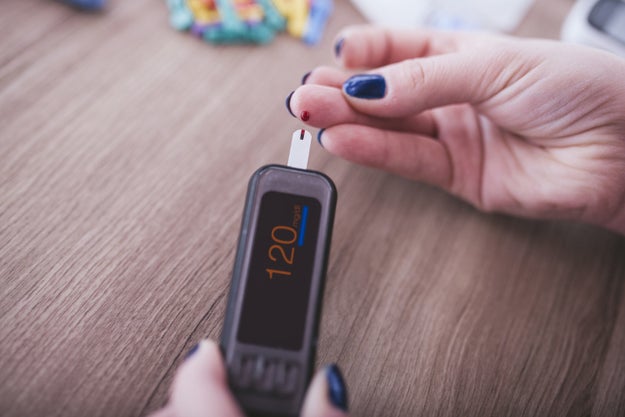
Azmanjaka / Getty Images
Sami Inkinen, co-founder of the real estate firm Trulia, figured he, of all people, was healthy. After all, he was a globally top-ranked triathlete. But around 2012, Inkinen’s doctor informed him that, despite his rigorous exercise, his carbohydrate-heavy diet had put him at risk for type 2 diabetes.
That led Inkinen to dive into the disease’s causes. And on Wednesday, he announced Virta Health, a new tech startup with a program that may, according to early research, be able to help patients reverse a diagnosis of type 2 diabetes.
Type 2 diabetes is rampant in the United States, where an estimated 28 million adults have it. It’s the country’s seventh-leading cause of death and costs an annual $245 billion in direct medical costs and lost productivity, according to the American Diabetes Association.
Virta aims for people to bring their diet and weight, and therefore their disease, under control, without surgery or medications — and it wants to make sure they follow through, even when they’re not physically in a doctor’s office.
“If we can reverse type 2 diabetes … and we can do it at scale with a solution accessible to anyone, this might be the first time we actually have the key to potentially solving this huge epidemic at the population level,” Inkinen told BuzzFeed News. In addition to Inkinen, the company’s founders are metabolic health and nutrition experts from UC Davis and Ohio State University.
Right now, a lot of doctors don’t have easy ways to monitor people if they’re not physically at a clinic. Marina Basina, an endocrinologist at Stanford University’s hospital, has patients come in every three to six months for disease-management classes. Otherwise, “if they have questions about diet or medication or blood sugar … we encourage them to send us messages through the hospital system, but obviously not everyone does it,” she said. “We’re relying on the patient.”

Virta Health
What Inkinen’s team is developing, in contrast, is a weight- and diet-monitoring program that can be administered anytime and from anywhere.
Here’s how it works: Patients sign up on Virta’s website. After being sent to a lab for a blood test, they videochat with a Virta doctor over their phone or computer.
Virta employs about five doctors who review patients’ vitals and make diet and medication recommendations; there’s also a set of virtual coaches who help patients adjust their food and medicine intake. They communicate with people through a combination of email, text, and phone, and after business hours, a chatbot supplies answers pre-approved by staff. Patients get personalized care and nutrition plans, which artificial intelligence-powered software helps shape by, for example, calculating a person’s unique risk for side effects. Finally, patients are given a box of FDA-approved devices with which to take daily measurements, such as blood sugar, blood pressure, and weight.
Unlike many health-technology startups, Virta is making its public debut with some proof under its belt. A study published Tuesday in the Journal of Medical Internet Research Diabetes looked at what happened to about 240 patients who underwent a 10-week trial of Virta’s program. The vast majority started out taking at least one diabetes medication, but by the end of the trial, most of them were able to cut back on or altogether stop taking at least one medication.
During a follow-up visit, 10 weeks after the trial ended, nearly half lowered their glucose to a level below a standard threshold for a diabetes diagnosis. And overall, participants lost an average of about 7% in body mass. (According to Basina, there is no such thing as outright “curing” a diagnosis of type 2 diabetes, but the best case scenario is to have the disease under control without need for medications.)
“A lot more needs to be done, but this is a very optimistic start,” said Bob Ratner, a professor of medicine at Georgetown University Medical School and an adviser to Virta.

Sami Inkinen, co-founder and CEO of Virta Health
Virta Health
Other doctors reacted more cautiously. Studies have shown that patients can effectively reverse their type 2 diabetes by losing weight, which sometimes means undergoing bariatric surgery. So Danny Sam, a primary care physician at Kaiser Permanente in Santa Clara, California, said he wasn’t surprised to see that Virta reported early improvements. Seeing results “sustained over a long period of time is the greatest challenge,” he told BuzzFeed News.
Similarly, William Cefalu, the American Diabetes Association’s chief scientific, medical and mission officer, said by e-mail that while the study confirmed previous trials, “there also exists a large body of evidence that demonstrates these extreme diets are not sustainable long term, once the high-support trial is concluded.”
Virta’s study is the first set of data from an ongoing two-year clinical trial, which upon completion will show if the results are truly long-lasting.
In the meantime, the startup has already lined up $37 million from some notable investors, like Obvious Ventures, the venture capital firm of Twitter cofounder Ev Williams; Paypal and Affirm founder Max Levchin’s SciFi VC; digital health investor Venrock; Allen & Company, and the Redmile Group.
Virta, which has about 60 employees total, charges patients $400 a month out of pocket for the first year. But people can also go through their employers if they cover it; Virta is focused on serving self-insured companies, although it won’t say how many customers it has.
And it offers a deal that may be hard for companies to refuse. Employers pay an upfront fee per patient. If, at the end of a year, a patient has not met criteria that indicate their diabetes has reversed, Virta refunds the employer.
“If we don’t deliver results in full, we deliver 100% of their money back,” Inkinen said.
Basina points out that even if Virta’s method works in the long run, she’s skeptical that it could someday be administered to all patients — particularly low-income ones — given the high intensity and costs of the monitoring. “This is a very selected patient population who are very, very highly motivated to do this,” she said.
Nevertheless, Virta is thinking big. “Our long term goal,” Inkinen says, “is to reverse diabetes in 100 million people.”
Quelle: <a href="This Health Startup Says Its Tech Can Reverse Diabetes“>BuzzFeed
Published by